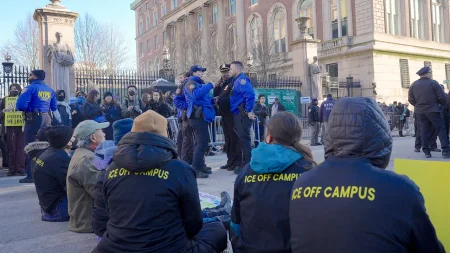Father Abandons Autistic Son During Delivery to Maintain Good Rating
In a shocking incident that unfolded last Thursday in Altamonte Springs, Florida, 35-year-old Uber Eats driver Jeremy Rouse now faces child neglect charges after his young, nonverbal son with autism was found wandering naked on a busy interstate entrance ramp. The situation could have ended in tragedy had it not been for the quick actions of two Good Samaritans who rescued the vulnerable child before he could enter the dangerous traffic lanes of Interstate 4. What makes this case particularly disturbing is that Rouse allegedly admitted to police that he noticed his son was missing from the vehicle but made the unconscionable decision to continue his delivery route rather than immediately searching for his child—all to maintain a good rating on the food delivery platform.
The dramatic rescue was recounted by Jamie Cabell, one of the bystanders who sprinted to save the child. “I was running pretty fast,” Cabell told local media. “Anything could’ve happened in a matter of seconds because cars were zooming by.” Alexandre Thomas-Brown, the second rescuer who joined in the life-saving effort, described the intense moment: “It was like we were running a quarter-mile run, and I had to catch this kid. I’m not going to let him go out into traffic. I have to save him.” Their quick thinking and immediate action likely prevented what could have been a devastating outcome for the vulnerable child, who was completely unable to communicate and at extreme risk on the busy roadway.
According to local reports, the child’s mother was also in the vehicle during the delivery route but had fallen asleep in the passenger seat. Upon waking, she immediately noticed the unusual quiet in the car and turned around to discover her son missing from his seat. This realization must have triggered immediate panic, as any parent would understand the grave danger a nonverbal autistic child would face alone near busy traffic—especially one without clothing and without the ability to call for help or understand the dangers around him. The age of the child has not been publicly disclosed, which adds another layer of concern to this already troubling situation.
Perhaps most disturbing in this case is Rouse’s reported explanation to police. Rather than immediately stopping his vehicle and searching for his missing child when he noticed the boy was gone, Rouse allegedly told authorities that he continued with his food deliveries because he feared receiving negative ratings that might affect his employment with Uber Eats. Furthermore, police reported that Rouse admitted he didn’t return to search for his son because he feared being arrested if he came back to the scene—suggesting he was more concerned with avoiding legal consequences than ensuring his child’s safety. This apparent prioritization of job performance over his son’s wellbeing has rightfully led to child neglect charges against the father.
This case highlights several troubling aspects of modern society: the pressure gig economy workers feel to maintain high ratings regardless of personal circumstances; the vulnerability of children with special needs who require constant supervision and care; and the split-second decisions parents must make when balancing work responsibilities with childcare duties. For families caring for children with autism, especially those who are nonverbal, vigilance is not just important—it’s essential for safety. Children with autism often have no concept of danger and may wander or bolt without warning, making constant supervision a necessity rather than an option.
While the incident ended without physical harm to the child thanks to the heroic actions of strangers, the emotional and psychological impact of such an event cannot be understated. The case also raises important questions about support systems for parents of special needs children, particularly those working in demanding jobs with unpredictable schedules. As authorities continue their investigation, this incident serves as a stark reminder that no delivery rating, job performance metric, or fear of consequences should ever take precedence over a child’s safety and wellbeing. The community response—strangers rushing to save an unknown child in danger—shows the better side of humanity in contrast to the troubling decisions that led to the dangerous situation in the first place.











